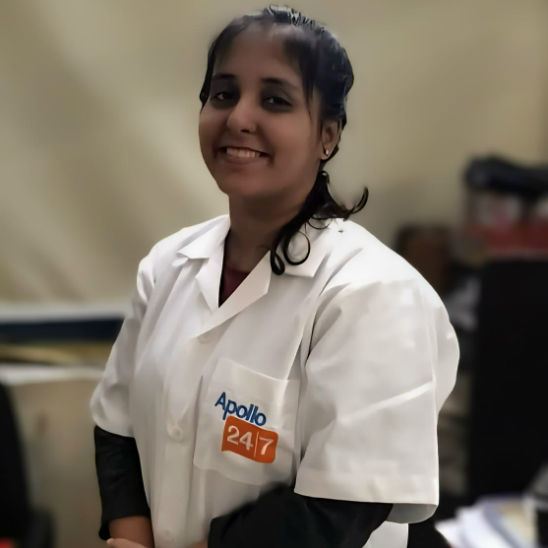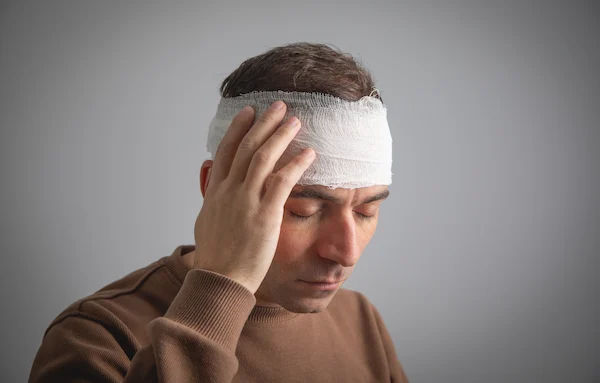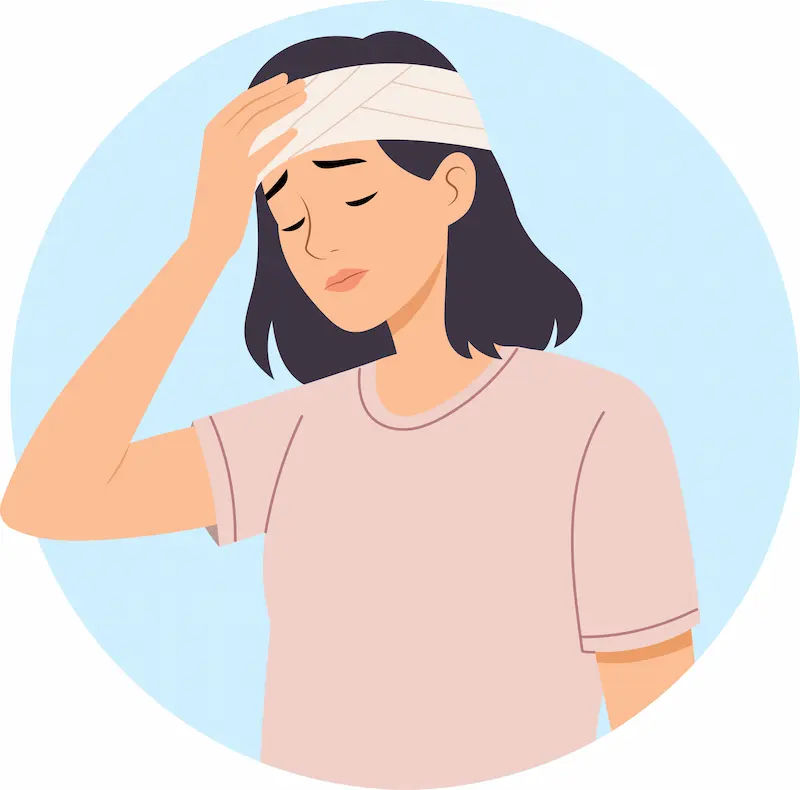Head Injury: Signs, Immediate Steps, and How to Prevent It
Know about the head injury, what it is, types, causes, recognise symptoms, prevention of head injuries, immidiate response and road to recovery and more.

Written by Dr. Rohinipriyanka Pondugula
Reviewed by Dr. M L Ezhilarasan MBBS
Last updated on 13th Jan, 2026

Introduction
A sudden fall, a sports collision, or a jarring car accident—in a split second, a blow to the head can happen to anyone. While a minor bump might just leave a temporary headache, a more significant impact can lead to a head injury with serious consequences for your brain health. Knowing how to identify the warning signs and taking swift, correct action is crucial. This guide goes beyond the basics, providing a comprehensive look at what causes these injuries, the critical symptoms you must never ignore, and most importantly, the proactive steps you can take to protect yourself and your loved ones. Whether you're a parent, an athlete, or simply concerned about everyday safety, understanding head injury prevention is your first and best defense.
What Exactly is a Head Injury?
A head injury is a broad term that describes any trauma to the scalp, skull, or brain. It's essential to understand that the visible damage a cut or a bruise often tells us very little about what's happening inside. The real concern is the potential injury to the brain, which can be jolted, bruised, or even bleed within the confines of the hard skull.
Consult an Emergency Doctor for Personalised Advice
The Difference Between a Bump on the Head and a Traumatic Brain Injury (TBI)
Not every knock on the head results in a TBI. A simple bump may cause localised pain and swelling, but no underlying brain dysfunction. A Traumatic Brain Injury (TBI), however, occurs when the force of the impact disrupts normal brain function. This is a key distinction. A TBI can be mild (a brief change in mental status), moderate, or severe (an extended period of unconsciousness or amnesia). Concussions are the most common form of mild TBI.
Common Types of Head Injuries: Concussions, Contusions, and Skull Fractures
- Concussion: A temporary, functional disturbance in the brain caused by a blow that makes the brain shake inside the skull. It may or may not involve a loss of consciousness.
- Contusion: A bruise on the brain itself, often causing bleeding and swelling. A coup-contrecoup injury is a contusion at both the site of impact and the opposite side of the brain, as it slams into the skull.
- Skull Fracture: A break in the skull bone. A fracture itself can be serious, but the greater danger is that a broken piece of bone can lacerate or press into the brain tissue.
- Intracranial Haemorrhage: This refers to bleeding within the skull, such as a subdural or epidural hematoma. This is a life-threatening medical emergency as the pooled blood puts pressure on the brain.
The Main Causes: What Leads to Head Injuries
Understanding the common causes is the first step toward effective head injury prevention.
Falls: The Leading Cause for All Ages
Falls are the number one cause of TBIs across all age groups, but they are particularly dangerous for young children and older adults. For infants, falls from beds or changing tables are a major risk. For the elderly, falls from standing height due to balance issues can have devastating consequences.
Sports-Related Impacts and Collisions
Contact sports like football, rugby, hockey, and boxing carry an inherent risk. However, non-contact sports and activities like cycling, skateboarding, skiing, and horseback riding are also leading causes of concussions and more severe head trauma due to high-speed falls or collisions with objects.
Motor Vehicle Accidents and Whiplash
Car, motorcycle, and bicycle accidents are a major source of traumatic head injuries. The sudden deceleration can cause the brain to crash against the inside of the skull. Whiplash—the rapid back-and-forth motion of the neck—can also cause a concussion without a direct blow to the head.
Physical Assaults and Violent Shaking
Unfortunately, assaults involving blunt force trauma to the head are a significant cause. In infants, Shaken Baby Syndrome is a severe form of abusive head trauma caused by violent shaking, which can cause devastating brain damage, blindness, or even death.
Recognising the Signs: When to Worry
Symptoms can be immediate or delayed, appearing hours or even days after the injury.
Immediate Symptoms Requiring Emergency Care (Red Flags)
These are danger signs that require a trip to the ER immediately:
- Loss of consciousness, even briefly.
- A worsening, severe headache.
- Convulsions or seizures.
- Repeated vomiting or nausea.
- Dilation of one or both pupils.
- Clear fluids draining from the nose or ears.
- Inability to awaken from sleep.
- Weakness or numbness in fingers and toes.
- Profound confusion, agitation, or slurred speech.
Delayed Symptoms That Can Appear Hours or Days Later
Even if you feel fine initially, watch for these signs of a head injury in the following days:
- Persistent mild-to-moderate headache.
- Dizziness, loss of balance, or vertigo.
- Sensitivity to light or noise.
- Fatigue, drowsiness, or feeling "in a fog."
- Sleep disturbances (sleeping much more or much less than usual).
- Cognitive problems like memory loss, difficulty concentrating, or slowed thinking.
- Mood changes: irritability, anxiety, sadness, or emotional instability.
Signs in Children and Infants: What Parents Must Watch For
Children may not be able to describe how they feel. Look for:
- Listlessness, tiring easily.
- Irritability and crankiness.
- Change in eating or nursing habits.
- Loss of interest in favourite toys.
- Unsteady walking or loss of balance.
- Persistent crying and inability to be consoled.
If your child displays any red-flag symptoms or if their behaviour seems off after a head impact, seek medical attention immediately. You can consult a paediatrician online with Apollo24|7 for a quick initial assessment to determine the best course of action.
Your Immediate Response: First Aid for Head Trauma
It should be:
1. Assess the Situation: Check for responsiveness and severe bleeding.
2. Call for Emergency Help: If any red-flag symptoms are present, call an ambulance. Do not move the person unless they are in immediate danger.
3. Stop Bleeding: Apply firm pressure to a bleeding wound with a clean cloth. Do not apply direct pressure if you suspect a skull fracture.
4. Do Not Move Their Neck: If a spinal injury is possible, keep the person's head and neck still.
5. Monitor: If the injury seems minor, stay with the person and monitor them closely for any worsening symptoms.
Do's and Don'ts While Waiting for Help
- DO keep the person calm and still.
- DO apply a cold pack to the swollen area (wrap it in a cloth first).
- DON'T give them aspirin or other anti-inflammatory drugs, as they can increase bleeding risk.
- DON'T leave them alone.
How to Prevent Head Injuries: A Proactive Guide
Prevention is always better than a cure. Here’s how to significantly reduce your risk.
Essential Safety Gear: Helmets for Every Activity
This is the single most effective step. Wear a properly fitted helmet for:
- Cycling, skateboarding, rollerblading
- Contact sports (football, hockey)
- Batting and running bases in baseball/softball
- Horseback riding
- Skiing and snowboarding
Making Your Home Fall-Proof
- Use safety gates at the top and bottom of stairs for young children.
- Install window guards.
- Use non-slip mats in bathtubs and on shower floors.
- Improve lighting throughout the home, especially on stairways.
- Secure rugs and remove clutter from walkways.
- Install handrails on both sides of stairways.
Safe Driving Practices to Prevent Accidents
- Always wear your seatbelt.
- Never drive under the influence of alcohol or drugs.
- Avoid distractions like texting while driving.
- Ensure children are in age- and size-appropriate car seats and booster seats.
Sports Safety and Rule Adherence
- Ensure playing fields are well-maintained.
- Enforce rules that prohibit dangerous play (e.g., spearing in football).
- Encourage a culture of reporting head impacts and symptoms without stigma.
- Support mandatory break periods and concussion protocol education for coaches and players.
The Road to Recovery: What to Expect
Recovery from a concussion or mild TBI requires patience. The brain needs time to heal.
The Critical Role of Cognitive Rest
This means limiting activities that require intense mental concentration. This includes:
- Restricting screen time (TV, computer, phone)
- Avoiding reading, schoolwork, and video games
- Taking time off from work or school
- Gradually reintroducing activities as symptoms improve. If symptoms persist beyond two weeks, consult a doctor online with Apollo24|7 for further evaluation and a structured recovery plan.
Long-Term Effects and Post-Concussion Syndrome
In some cases, symptoms can last for weeks or months; this is known as Post-Concussion Syndrome (PCS). Management involves a multi-disciplinary approach, including neurology, vestibular therapy, and sometimes cognitive behavioural therapy.
Conclusion
A head injury is a serious event that demands respect and prompt attention. By understanding the causes from everyday falls to sports collisions and committing to proactive head injury prevention strategies like helmet use and home safety, you can dramatically reduce your risk. Most importantly, being able to recognise the critical signs of a head injury empowers you to take life-saving action for yourself and others. Recovery can be a slow journey that requires patience and proper medical guidance. Listen to your body, prioritise rest, and never hesitate to seek professional medical evaluation to ensure your brain has the best possible chance to heal fully and safely. Your brain is your most valuable asset; protect it wisely.
Consult an Emergency Doctor for Personalised Advice
Consult an Emergency Doctor for Personalised Advice

Dr. Vivek D
General Physician
4 Years • MBBS
Bengaluru
PRESTIGE SHANTHINIKETAN - SOCIETY CLINIC, Bengaluru

Dr Aakash Andgi
General Physician/ Internal Medicine Specialist
9 Years • MBBS MD
Bengaluru
Apollo Clinic, JP nagar, Bengaluru

Dr. Anand Ravi
General Physician
2 Years • MBBS
Bengaluru
PRESTIGE SHANTHINIKETAN - SOCIETY CLINIC, Bengaluru

Dr. Ashita Kuruvilla
General Physician/ Internal Medicine Specialist
7 Years • MBBS
East Midnapore
VIVEKANANDA SEBA SADAN, East Midnapore

Dr Syed Mateen Pasha
General Physician
2 Years • MBBS
Bengaluru
PRESTIGE SHANTHINIKETAN - SOCIETY CLINIC, Bengaluru
Consult an Emergency Doctor for Personalised Advice

Dr. Vivek D
General Physician
4 Years • MBBS
Bengaluru
PRESTIGE SHANTHINIKETAN - SOCIETY CLINIC, Bengaluru

Dr Aakash Andgi
General Physician/ Internal Medicine Specialist
9 Years • MBBS MD
Bengaluru
Apollo Clinic, JP nagar, Bengaluru

Dr. Anand Ravi
General Physician
2 Years • MBBS
Bengaluru
PRESTIGE SHANTHINIKETAN - SOCIETY CLINIC, Bengaluru

Dr. Ashita Kuruvilla
General Physician/ Internal Medicine Specialist
7 Years • MBBS
East Midnapore
VIVEKANANDA SEBA SADAN, East Midnapore

Dr Syed Mateen Pasha
General Physician
2 Years • MBBS
Bengaluru
PRESTIGE SHANTHINIKETAN - SOCIETY CLINIC, Bengaluru
More articles from Head Injury
Frequently Asked Questions
How long after hitting your head can a brain bleed occur?
A brain bleed can begin immediately after the impact, but symptoms may take hours or even days to develop as the bleeding or swelling gradually increases pressure inside the skull. This is why monitoring for 24-48 hours is crucial.
Is it okay to sleep after a concussion?
The old advice was to keep someone awake. Modern guidelines state that it is safe to sleep, as rest aids healing. However, a person should be woken every 2-3 hours for the first 24 hours to check for alertness and worsening symptoms like confusion or vomiting.
What is the best way to treat a minor bump on the head at home?
For a minor bump with no red-flag symptoms, apply a cold compress wrapped in a cloth to the area for 20 minutes to reduce swelling. Rest, take over-the-counter pain relievers like acetaminophen (not aspirin or ibuprofen initially), and monitor closely for any delayed symptoms.
Can a head injury cause problems years later?
Some research suggests that repeated mild TBIs or a severe TBI may be linked to an increased risk of neurological conditions later in life, such as chronic traumatic encephalopathy (CTE), depression, or cognitive decline. This underscores the critical importance of proper prevention, management, and recovery from every single head injury.
What tests are done to check for a serious head injury?
Doctors use a neurological exam to check vision, hearing, reflexes, and coordination. The most common imaging test is a CT scan, which quickly identifies skull fractures, bleeding, or swelling in the brain. An MRI may be used later to see more detailed images of brain tissue.

